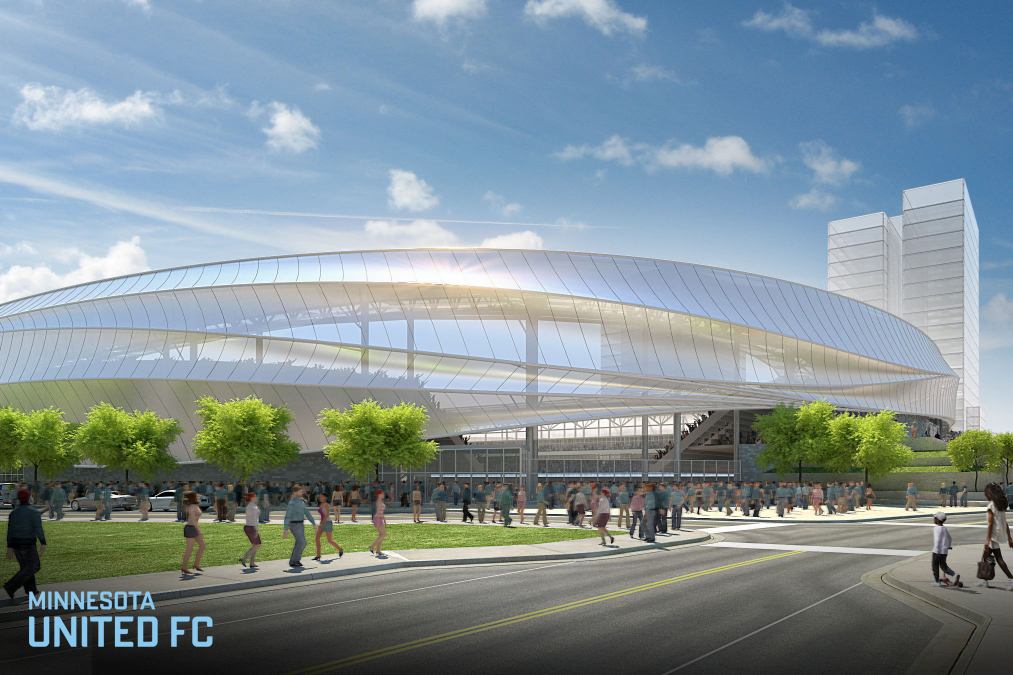We last reported last Thursday that the Senate version of the Minnesota United soccer stadium bill was brought to the capital. Later that afternoon, the House version was introduced by Tim Sanders (R-Blaine), who is sponsoring the bill. The measure seems to have broad support in the House, but questions remain. Will stadium fatigue play into the passing of the stadium bill, which has three provisions?
House bill HF 3334 was co-written by a large bipartisan group of 11 lawmakers who come from both the metro area and outstate. Rena Moran (D-St. Paul), Joe Hoppe (R-Chaska), Carlos Mariani (D-St. Paul), Bud Nornes (R-Fergus Falls), Leon Lillie (D-North St. Paul), Joe Atkins (D-Inver Grove Heights), Paul Thissen (D Minneapolis-House Minority Leader), Bob Gunther (R-Fairmont), Michael V. Nelson (D-Brooklyn Park), and Peter Fischer (D-Maplewood) all are listed as authors of the bill, which appears identical to the Senate version.
There are three provisions in the bill: A property tax exemption, a sales tax exemption on construction materials and a private liquor license for the stadium. The liquor license provision has been referred to the Senate Commerce Committee and the House Commerce and Regulatory Reform Committee.
It’s still unknown which committees will examine the two tax provisions for the bill, but it’s expected to be heard before April 1. The tax exemption is for a 12-acre parcel, most of that being stadium property (eight acres) which is principally comprised of Metro Transit’s old “bus barn” site. That property has been sitting vacant for 20 years and off the tax rolls for over 50 years. The remaining four acres is green and open space which is currently part of the larger 25-acre Midway Center site owned by RK Midway. The plan involves Minnesota United buying that property from owner Rick Birdoff and then giving it to the City of St. Paul along with the stadium after the completion of construction. Minnesota United would maintain the properties and would make payments to the city to lease the “bus barn” property from Metro Transit. Those lease payments would go to Metro Transit’s general operating fund, which is used throughout the seven-county metro area. Construction of the stadium itself will be completely funded by Minnesota United.
House sponsor Sanders told the Star Tribune that he thought the deal shouldn’t have any issues being approved by lawmakers, especially with the low cost compared to other stadiums. “As long as people get over the stigma of this being a stadium bill, and look at the actual language, it should pass,” said Sanders.
Senate sponsor Pappas told the Pioneer Press that approval “shouldn’t be” a hard lift for lawmakers and said she’s heard of little push-back against the measure in the Legislature or in St. Paul.
“It is very similar to what we’ve done for other ballfields like the Saints, the forgiveness of taxes on construction materials, and I don’t think the property taxes will be an issue because they’re not generating any property taxes there now,” Pappas said.
However, House Speaker Kurt Daudt (R-Crown) said he is not as confident that the bill will sail through the legislature. “It could potentially, uh, very definitely could run into some roadblocks,” said Daudt, who had not yet read the bill. “I’ve said all along people should not underestimate the level of stadium fatigue at the Capitol.
“But I also think, you know, we want to do what’s right,” said Daudt. “And if the city wants to exempt and the school district wants to exempt this property from property taxes I think we can certainly look at that option.”
Minnesota United hopes to get the stadium bill passed so they can start building the $150 million plus structure in early June, with a completion date of March 2018.

Leave a Reply